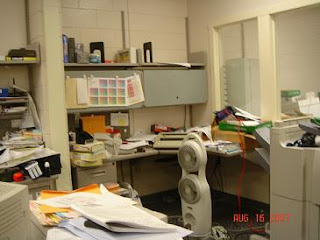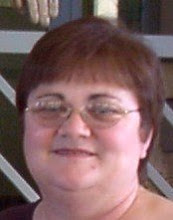I've had the opportunity to present content enhancement information to several new groups during the last few weeks. The last two days I was really fortunate in that the group was really small, so we w
 ere able to have a constant dialogue which allows us all to learn so much more. I've been thinking about a couple of opposing ideas. Think for a minute about organization... about making order out of something. When I go into my "junk" drawer where I deposit odds and ends for months (or even years), I would consider it completely disorganized. (As would most people, I would assume.) When I look for the key to the shed, or a charm that was lost from a bracelet, I might go to my junk drawer and start pawing through it, hoping to find it! I can apply the idea of organization in a different way as well. I have a ton of books. I LOVE BOOKS! I've read many of them, but there are just as many I have not read. I've given lots away and loaned many. For a long time, I had all my books in one place. At least, when I went to look for one, I knew that it "should" be with all the other books. In the last two years, I've taken the time to organize them somewhat. I have my fiction books in one place, and they are organized alphabetically by author's last name. I have my professional books in a bookcase in my office also organized by author's last name. I have my picture books in another bookcase organized by title, adolescent fiction in another place, etc. This has made finding an individual title when I want it SO much easier. Another dimension that has been affected is time; I can find my books in far less time now. I'm happier, too. Being able to locate a particular book, especially when I'm in a hurry, has reduced stress. Another benefit that I didn't expect was the ability to remember information related to the books. If I don't find the book I want, it triggers a memory that I loaned it or that I took it with me and may have left it somewhere. Do these effects of being organized (reduced time, ease in finding, less stress, memory triggers) translate to increased comprehension? I definitely think so.
ere able to have a constant dialogue which allows us all to learn so much more. I've been thinking about a couple of opposing ideas. Think for a minute about organization... about making order out of something. When I go into my "junk" drawer where I deposit odds and ends for months (or even years), I would consider it completely disorganized. (As would most people, I would assume.) When I look for the key to the shed, or a charm that was lost from a bracelet, I might go to my junk drawer and start pawing through it, hoping to find it! I can apply the idea of organization in a different way as well. I have a ton of books. I LOVE BOOKS! I've read many of them, but there are just as many I have not read. I've given lots away and loaned many. For a long time, I had all my books in one place. At least, when I went to look for one, I knew that it "should" be with all the other books. In the last two years, I've taken the time to organize them somewhat. I have my fiction books in one place, and they are organized alphabetically by author's last name. I have my professional books in a bookcase in my office also organized by author's last name. I have my picture books in another bookcase organized by title, adolescent fiction in another place, etc. This has made finding an individual title when I want it SO much easier. Another dimension that has been affected is time; I can find my books in far less time now. I'm happier, too. Being able to locate a particular book, especially when I'm in a hurry, has reduced stress. Another benefit that I didn't expect was the ability to remember information related to the books. If I don't find the book I want, it triggers a memory that I loaned it or that I took it with me and may have left it somewhere. Do these effects of being organized (reduced time, ease in finding, less stress, memory triggers) translate to increased comprehension? I definitely think so.However, if we look at it in reverse - comprehension preceding organization, I think there is some truth to this as well. I have to have some conceptual knowledge about my books before I can even organize them. I have to know if they are fiction or non-fiction. I have to know the broad category of where they "fit in". Think about a really common context - the grocery store... I wouldn't find potato chips in the produce aisle. So for initial understanding, I would say that very rudimentary organization must occur. We have to be able to conceptualize and categorize. However, once we get a few pieces of information, we must then organize it to be able to make broader generalizations. I'm thinking about data collection. We can have hundreds of separate bits of data - student demographics, pretest scores, post-test scores, raw scores, t-scores, and so on. It isn't until all of the data is organized in some way that we are able to make sense of it. Once we have several pieces or "bits of knowledge" we can begin to analyze, synthesize, evaluate, and make decisions about needs for further understanding. Organized information allows us to ask the right questions and focus our attentions in deeper and broader understanding.
So - let's apply this to subject matter in classrooms - especially secondary classrooms. The implication I take away is that students must have some broad conceptual knowledge base first. From there, it is through organization of information and interpretation of information that new understandings take place. Isn't that what content enhancement does? Think about any of the routines. We separate out all of the critical information first, we help students organize it by sorting through it and teaching them how to arrange it in ways that will lead to higher level comprehension and understanding of ideas.
What are your thoughts on this? Am I on the right track? I've included a couple of pictures in this entry of an office that blew my mind. I was in a school, and this was the secretary's office. She said that she could find anything in a heartbeat. I wonder, though...how does this fit with my theory?



5 comments:
HI Sue, Maybe this isn't an either or. Maybe each just helps the other--that is creating a unit organizer might force you to better understand your content, but as you better understand your content, you find easier to make a quality organizer.
I deleted Jim's second comment because it was a copy of the first comment. :-) I'm not into censorship!
Hi Sue,
Congratulations on your new blog site and thank you for providing a 21st Century mode of communication. As I look at the visual of the secretary's office that you provided, I am reminded that the purpose of organization is not only for ourselves, but also to provide information to others. Communication requires the ability to organize and articulate. So if something were to happen to the secretary, would the information be accessible to others? As in the classroom, teachers not only need to understand the content themselves, they must be able to organize the information so it can be accessible to all. Thus the concept of Universal Design in Learning and accessibilty. That is what we do as teachers. We interpret the information so that it is understood not only by ourselves, but by our students as well. It is an on going cycle of comprehension, organization and articulation. To articulate you must be able to both comprehend and organize.
I am so glad this wasn't your office. I was a little worried when I first saw this. I am enjoying your new blog site.
Post a Comment